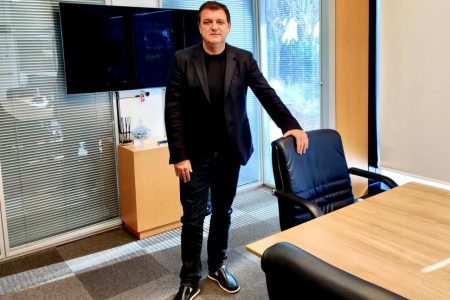When he graduated in Administration and Accounting, José Maurício Caldeira had no idea that he would become a shareholder in the Asperbras Group. The idea of leaving São José do Rio Preto and diving into other continents and leading large projects did not pass in his mind.
José Maurício Caldeira’s successful trajectory coincides with that of Asperbras, which started in the field of agricultural implements for irrigation, later advancing in the manufacture of PVC pipes and Rotomolding. The success resulting from the quality of its products boosted the company to become a large business group, with activities in different segments.
Currently, the Group operates in several states in Brazil, in addition to three other continents: Africa, Europe and South America. Its business covers food, infrastructure construction, truck and bus dealerships, energy generation and also the manufacture of MDF boards and real estate developments.
FROM SÃO JOSÉ DO RIO PRETO TO AFRICA
At the age of 13, Caldeira started working in accounting offices in São José do Rio Preto. At 18, he entered college to study Business Administration. In this initial period of his life in the world of work, the businessman never imagined taking part in large projects, linked to the development of countries like Angola and Congo.
Caldeira founded his own business in 1994. After working for ten years as a dealership and tire sales network manager, he created the consultancy JMC Consulting, which has now become a personal investment holding company outside the Asperbras Group.
When he was appointed, in 2002, to the brothers Roberto and Francisco Colnaghi, owners of Asperbras, to advise on the company’s internationalization, a period in which the business was about to start its first ventures in Africa, Caldeira experienced a watershed in his career.
ANGOLA POST CIVIL WAR
The businessman arrived in the African country in a post-war scenario. “There was a country to be remade there,” he recalls. The beginning was a trading business. But local demands ended up evolving and transforming. To meet needs, such as the supply of construction materials, an industrial complex was eventually developed.
Unexpected obstacles also emerged as a great cultural barrier, ranging from office hours to attitude towards work. “We respect the local culture, but we invest in training. With this, we identified the best employees and provided them with conditions to serve as an example”, emphasizes the businessman. “The result of this policy is that today we have low labour turnover. There are people in Angola who have been with us since the beginning. All this was a very gratifying experience”, he sums up.
CHALLENGE IN CONGO
José Maurício Caldeira took another step alongside Asperbras, in 2011, with the company’s arrival in Congo. The Angolan experience helped the group in the initiative to invest in a new industrial district in Brazaville, the country’s capital. In that period, the company employed more than five thousand workers. Part of the challenge of the undertaking was to deal with a country whose official language is French. One of the first measures adopted was to hire Portuguese professionals, who managed to make communication flow in Portuguese and French.
Caldeira stresses the partnership with the president of Asperbras, José Roberto Colnaghi, as an important success factor. He considers that Colnaghi’s optimism and confidence were essential to achieve balance in decisions.
NEW INVESTMENTS
Asperbras demonstrated confidence in the country with bold investments in diversified segments in 2018, a very turbulent period in the Brazilian economy. Despite the uncertainties in the economic scenario, the company opened an MDF factory in Água Clara (MS), GreenPlac; a sustainable plant in Guarapuava (PR), Abitte, a new brand for real estate projects, which has already launched several projects and inaugurated Bonolat’s second dairy plant in Penápolis (SP).

